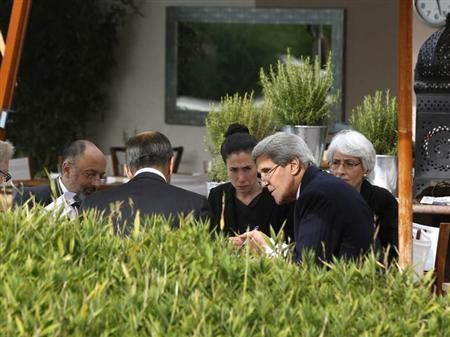US, Russia Reach Agreement To Eliminate Syria’s Chemical Weapons Stockpile

The U.S. and Russia have reached an agreement on a framework to secure and destroy Syria’s chemical-weapons stockpile, U.S. Secretary of State John Kerry and Russian Foreign Minister Sergey Lavrov said at a joint news conference in Geneva Saturday.
According to the deal, which would be backed by a U.N. Security Council resolution, Syria must disclose its complete chemical-weapons stockpile within one week and give United Nations inspectors unfettered access to all its chemical weapons ahead of eliminating them, the Associated Press reported.
Kerry said a time frame for identifying and destroying the chemical weapons has been stipulated, and Syria could face consequences such as sanctions and other punitive actions should it fail to comply.
“Providing this framework is fully implemented, it can end the threat these weapons pose not only to the Syrian people but also to their neighbors,” Al Jazeera quoted Kerry as saying. “The world will now expect [President Bashar] Assad's regime to live up to its commitments. ... There can be no room for games. Or anything less than full compliance by the Assad regime.”
Kerry, referring to possibility of a military strike should Syria violate the terms of the deal, said that a response in accordance with U.N. Charter Chapter 7 -- which provides for military action by “air, sea, or land forces as may be necessary to maintain or restore international peace and security” -- could be undertaken, assuming other options fail.
According to the agreement, U.N.-appointed inspectors must be in Syria no later than November and destruction of the country’s chemical-weapons stockpile should be completed by mid-2014, CNN reported.
However, Lavrov said the current agreement doesn’t provide for use of military force in Syria, but if the nation fails to cooperate with investigators, the issue could be addressed by the U.N. Security Council. He added that all agreements reached on Syria’s chemical weapons will be “formalized in legally binding documents,” the Russian-based Interfax news agency reported.
However, it is unclear which country will destroy the chemical weapons and whether the disposal will be carried out inside or outside Syria.
Senior U.S. administration officials told reporters earlier in the day on condition of anonymity that the U.S. would not insist on including military action against Syria in the deal, as they do not expect Russia to back any such resolution in the U.N.
The agreement came on the third day of intense talks between Washington and Moscow to resolve the stand-off on Syria. Both the sides have confirmed they intend to continue the talks to resolve broader issues, including the political crisis associated with the country’s civil war.
© Copyright IBTimes 2025. All rights reserved.






















